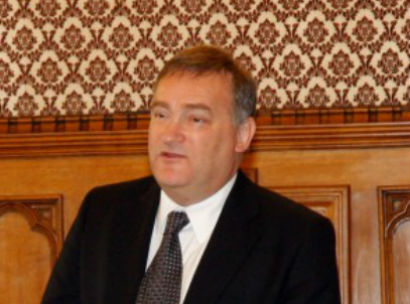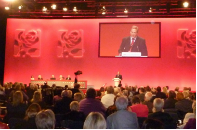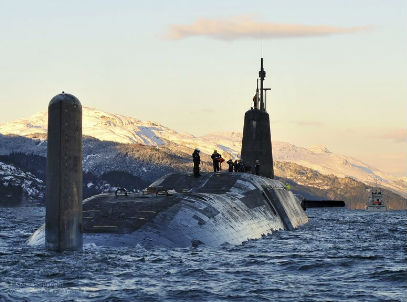The Labour Shadow Defence Team has launched the Labour Party’s Defence Policy Review and is seeking submissions.
It is vital that members engage in and shape the debate particularly regarding the Labour Party’s current policy on the continued possession of nuclear weapons and engagement in foreign military interventions.
We must ensure the party commits to scrapping Trident and ending our role in destructive wars.
Labour CND has drafted two model responses for you to consider submitting both to the Defence Policy Review and to your National Policy Forum representatives.
You can do so both as an individual member and via your CLP.
The National Policy Forum Britain in the World Commission is meeting in mid-June so we suggest you do this immediately after the elections in May.
- Please ensure you submit this to the Labour Shadow Defence Review by emailing officeoflfof@gmail.com and posting to Shadow Defence Secretary Jim Murphy at the House of Commons, London SW1A 0AA
- You should also send it to your National Policy Forum representatives, via the MembersNet section of the Labour Party website – http://members.labour.org.uk/npfrep
- Please tell us if you have made such a submission, on info@labourcnd.org.uk
__________________________________________________________________
Labour and Trident replacement
Labour will put greater importance on working with other nuclear weapon states to increase progress on nuclear reductions and disarmament towards the goal of global abolition.
Labour will encourage non-nuclear states to also keep up their pressure for nuclear disarmament as required by the Nuclear Non- Proliferation Treaty.
Labour will back a global nuclear weapons convention with the ultimate aim of the total elimination of nuclear weapons.
Labour will make a clear commitment to scrap Trident and all plans for Trident replacement.
Supporting arguments:
The Labour Party needs to change its policy on Trident and its replacement.
Trident or its replacement does not address our real threats. Even the Coalition Government has confirmed that the UK does not face a nuclear weapon threat from another state, according to their National Security Strategy published in 2011. The possession of Trident does not increase our security. It is not a means of defence, it is means of attack. As such it could prove a magnet for attack in a conflict situation.
Trident or its replacement is a green light to nuclear weapons proliferation. It sends the wrong message at a point when the US and Russia are taking further disarmament steps. It is through honouring our nuclear disarmament commitment that we can achieve a nuclear weapons free world.
Trident replacement is unaffordable. Constructing and maintaining Trident’s replacement will cost over £100billion over its lifetime to 2060. In the shorter term the maintaining the existing Trident system and constructing the Trident replacement will cost us £55billion over the next 15 years.
Trident replacement is unpopular. There is clear and consistent polling evidence that shows the public is opposed to Trident replacement. Even amongst the defence community, many do not favour a costly nuclear weapon system in the face of other public spending cuts.
__________________________________________________________________
Labour and a new foreign policy
Labour will adopt a foreign policy that rejects military interventionism and nuclear aggression.
Labour will reject the principle that UK forces should operate anywhere in the world. Their only purpose should be for the defence of these islands.
Labour will support peaceful negotiations and dialogue through the UN and its member states, in conflict situations.
Labour will immediately withdraw troops from Afghanistan and advocate global disarmament, including a Weapons of Mass Destruction Free Zone in the Middle East and the scrapping of Trident here in the UK.
Supporting arguments:
Ed Miliband stated in his first speech as leader that ‘This generation wants to change our foreign policy so that it’s always based on values, not just alliances.’
The UK’s alliances, notably with the US and NATO or other Western powers, have led the country into numerous military strikes and wars in recent years, particularly Iraq and Afghanistan, under the justification of ‘liberal interventionism. This policy has damaged our international standing and lacks public support in the UK.
These interventions have been selective, seizing on certain internal conflicts and perceived threats, whilst ignoring others.
These interventions have left thousands dead and injured, harming rather than helping the people who live there and leaving behind countries that are neither stable nor safe.
These interventions have only been for the benefit of multi-national corporations and Western powers seeking to gain access to natural resources and infrastructure contracts.
Any justification for these wars has been seen to be lies to disguise the real intention of extending Western strategic control and interests.
The UK’s Cold War-era alliance, NATO, has expanded its sphere of influence by encouraging former Warsaw Pact countries to join and engaging in ‘out of area’ operations. Given the Warsaw Pact was dissolved twenty years ago, serious questions remain unanswered as to the role of NATO.
A progressive, socialist foreign policy requires resources and skills to be committed to reducing poverty and improving living standards rather than supporting military action and the instability and misery it causes.
 Nuclear conflict is a scenario too horrific to contemplate. The existence of weapons of mass destruction like Trident is bad enough but plans to replace our current stockpile with newer, more powerful and eye-wateringly expensive warheads at time of financial crisis is morally as well as practically questionable.
Nuclear conflict is a scenario too horrific to contemplate. The existence of weapons of mass destruction like Trident is bad enough but plans to replace our current stockpile with newer, more powerful and eye-wateringly expensive warheads at time of financial crisis is morally as well as practically questionable.














